Consumer Behavior Report: Carbon Labeling and Consumer Choices
VerifiedAdded on 2022/08/18
|10
|2459
|10
Report
AI Summary
This report examines consumer behavior concerning carbon labeling, a contemporary issue in marketing. It begins with an introduction to the psychological processes driving consumer purchasing decisions, including perception, motivation, and past experiences, and then explores the concept of carbon labeling. The report reviews relevant literature, analyzing barriers to environmentally responsible choices, such as attitude-behavior gaps, budget constraints, and lack of consumer knowledge. It presents qualitative research findings from interviews with consumers, revealing their preferences and the factors influencing their purchasing decisions. The report concludes with recommendations for both consumers and businesses on how to bridge the 'green gap' and promote sustainable consumption, emphasizing the importance of awareness, knowledge, and responsible marketing practices. Overall, the report emphasizes the need for increased consumer awareness and education to encourage environmentally conscious purchasing behavior, and for businesses to adopt sustainable practices.
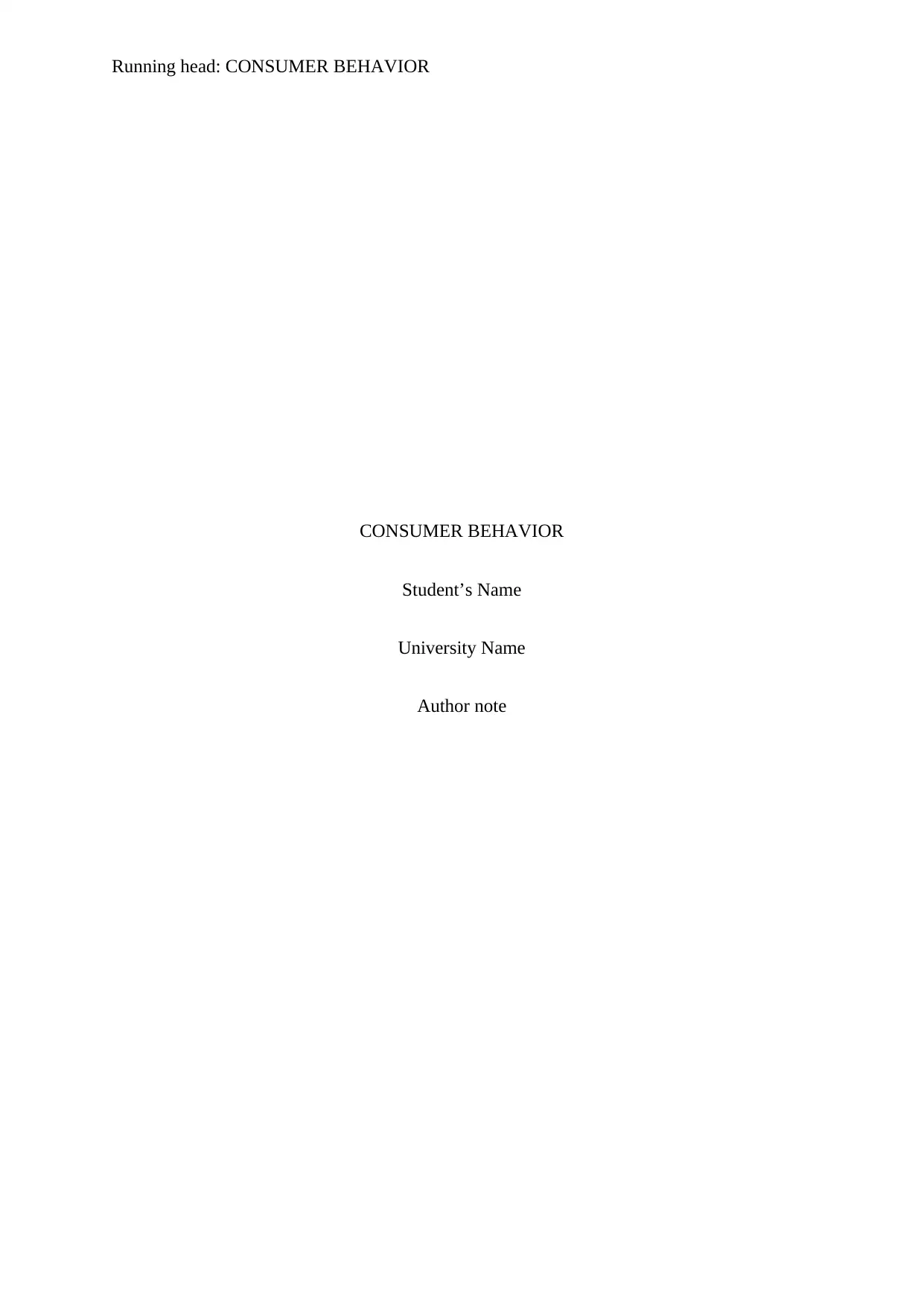
Running head: CONSUMER BEHAVIOR
CONSUMER BEHAVIOR
Student’s Name
University Name
Author note
CONSUMER BEHAVIOR
Student’s Name
University Name
Author note
Paraphrase This Document
Need a fresh take? Get an instant paraphrase of this document with our AI Paraphraser
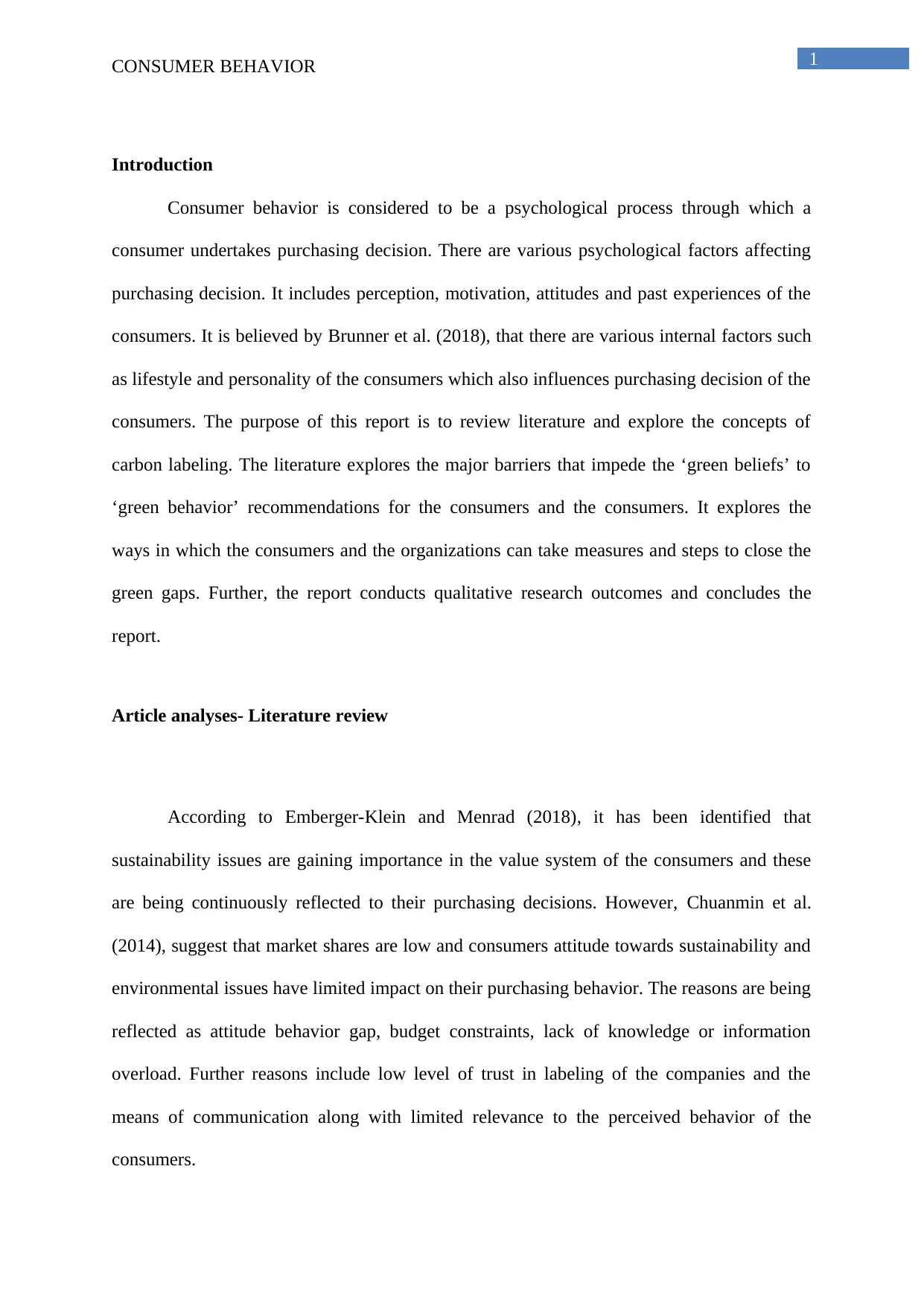
1CONSUMER BEHAVIOR
Introduction
Consumer behavior is considered to be a psychological process through which a
consumer undertakes purchasing decision. There are various psychological factors affecting
purchasing decision. It includes perception, motivation, attitudes and past experiences of the
consumers. It is believed by Brunner et al. (2018), that there are various internal factors such
as lifestyle and personality of the consumers which also influences purchasing decision of the
consumers. The purpose of this report is to review literature and explore the concepts of
carbon labeling. The literature explores the major barriers that impede the ‘green beliefs’ to
‘green behavior’ recommendations for the consumers and the consumers. It explores the
ways in which the consumers and the organizations can take measures and steps to close the
green gaps. Further, the report conducts qualitative research outcomes and concludes the
report.
Article analyses- Literature review
According to Emberger-Klein and Menrad (2018), it has been identified that
sustainability issues are gaining importance in the value system of the consumers and these
are being continuously reflected to their purchasing decisions. However, Chuanmin et al.
(2014), suggest that market shares are low and consumers attitude towards sustainability and
environmental issues have limited impact on their purchasing behavior. The reasons are being
reflected as attitude behavior gap, budget constraints, lack of knowledge or information
overload. Further reasons include low level of trust in labeling of the companies and the
means of communication along with limited relevance to the perceived behavior of the
consumers.
Introduction
Consumer behavior is considered to be a psychological process through which a
consumer undertakes purchasing decision. There are various psychological factors affecting
purchasing decision. It includes perception, motivation, attitudes and past experiences of the
consumers. It is believed by Brunner et al. (2018), that there are various internal factors such
as lifestyle and personality of the consumers which also influences purchasing decision of the
consumers. The purpose of this report is to review literature and explore the concepts of
carbon labeling. The literature explores the major barriers that impede the ‘green beliefs’ to
‘green behavior’ recommendations for the consumers and the consumers. It explores the
ways in which the consumers and the organizations can take measures and steps to close the
green gaps. Further, the report conducts qualitative research outcomes and concludes the
report.
Article analyses- Literature review
According to Emberger-Klein and Menrad (2018), it has been identified that
sustainability issues are gaining importance in the value system of the consumers and these
are being continuously reflected to their purchasing decisions. However, Chuanmin et al.
(2014), suggest that market shares are low and consumers attitude towards sustainability and
environmental issues have limited impact on their purchasing behavior. The reasons are being
reflected as attitude behavior gap, budget constraints, lack of knowledge or information
overload. Further reasons include low level of trust in labeling of the companies and the
means of communication along with limited relevance to the perceived behavior of the
consumers.
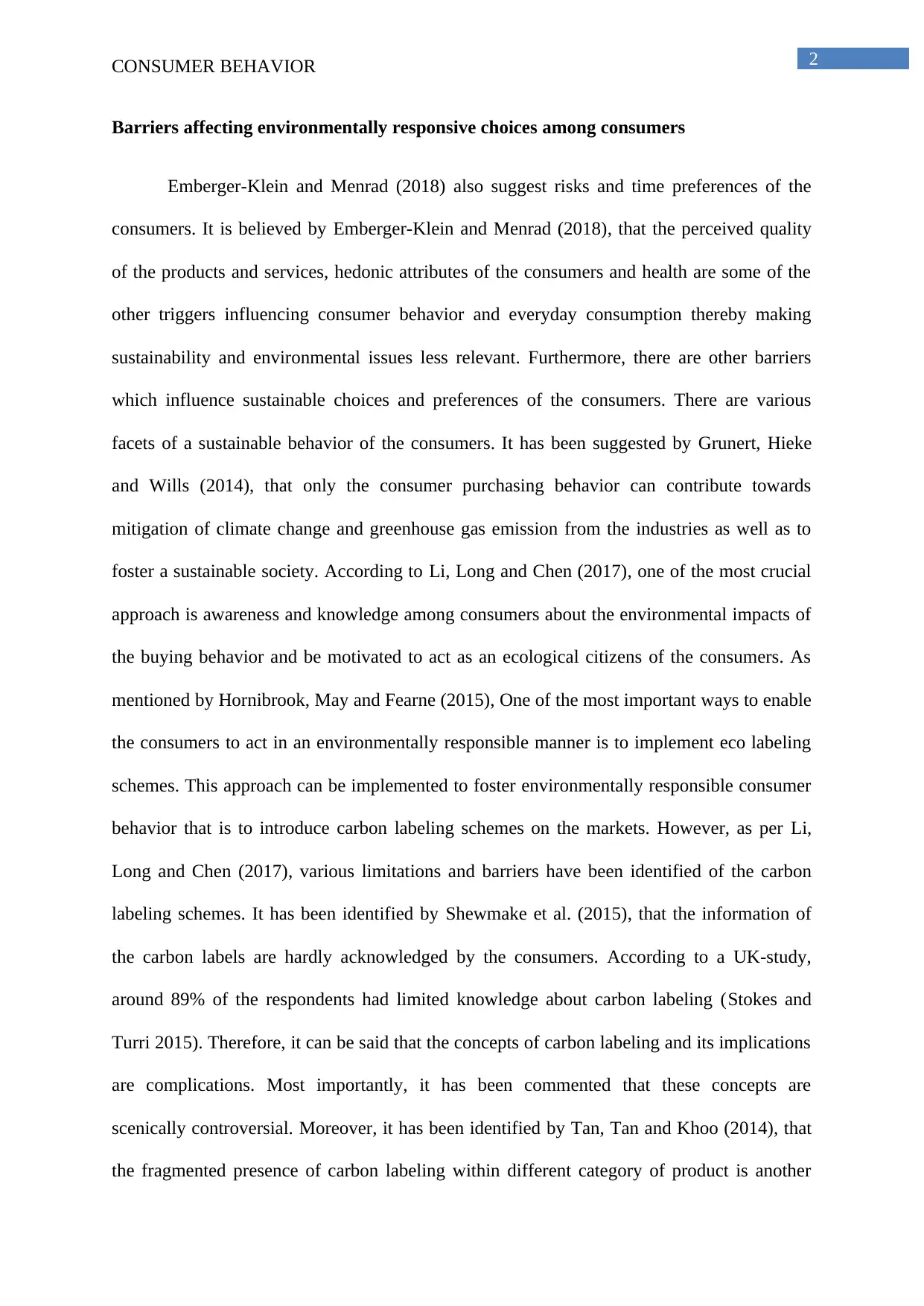
2CONSUMER BEHAVIOR
Barriers affecting environmentally responsive choices among consumers
Emberger-Klein and Menrad (2018) also suggest risks and time preferences of the
consumers. It is believed by Emberger-Klein and Menrad (2018), that the perceived quality
of the products and services, hedonic attributes of the consumers and health are some of the
other triggers influencing consumer behavior and everyday consumption thereby making
sustainability and environmental issues less relevant. Furthermore, there are other barriers
which influence sustainable choices and preferences of the consumers. There are various
facets of a sustainable behavior of the consumers. It has been suggested by Grunert, Hieke
and Wills (2014), that only the consumer purchasing behavior can contribute towards
mitigation of climate change and greenhouse gas emission from the industries as well as to
foster a sustainable society. According to Li, Long and Chen (2017), one of the most crucial
approach is awareness and knowledge among consumers about the environmental impacts of
the buying behavior and be motivated to act as an ecological citizens of the consumers. As
mentioned by Hornibrook, May and Fearne (2015), One of the most important ways to enable
the consumers to act in an environmentally responsible manner is to implement eco labeling
schemes. This approach can be implemented to foster environmentally responsible consumer
behavior that is to introduce carbon labeling schemes on the markets. However, as per Li,
Long and Chen (2017), various limitations and barriers have been identified of the carbon
labeling schemes. It has been identified by Shewmake et al. (2015), that the information of
the carbon labels are hardly acknowledged by the consumers. According to a UK-study,
around 89% of the respondents had limited knowledge about carbon labeling (Stokes and
Turri 2015). Therefore, it can be said that the concepts of carbon labeling and its implications
are complications. Most importantly, it has been commented that these concepts are
scenically controversial. Moreover, it has been identified by Tan, Tan and Khoo (2014), that
the fragmented presence of carbon labeling within different category of product is another
Barriers affecting environmentally responsive choices among consumers
Emberger-Klein and Menrad (2018) also suggest risks and time preferences of the
consumers. It is believed by Emberger-Klein and Menrad (2018), that the perceived quality
of the products and services, hedonic attributes of the consumers and health are some of the
other triggers influencing consumer behavior and everyday consumption thereby making
sustainability and environmental issues less relevant. Furthermore, there are other barriers
which influence sustainable choices and preferences of the consumers. There are various
facets of a sustainable behavior of the consumers. It has been suggested by Grunert, Hieke
and Wills (2014), that only the consumer purchasing behavior can contribute towards
mitigation of climate change and greenhouse gas emission from the industries as well as to
foster a sustainable society. According to Li, Long and Chen (2017), one of the most crucial
approach is awareness and knowledge among consumers about the environmental impacts of
the buying behavior and be motivated to act as an ecological citizens of the consumers. As
mentioned by Hornibrook, May and Fearne (2015), One of the most important ways to enable
the consumers to act in an environmentally responsible manner is to implement eco labeling
schemes. This approach can be implemented to foster environmentally responsible consumer
behavior that is to introduce carbon labeling schemes on the markets. However, as per Li,
Long and Chen (2017), various limitations and barriers have been identified of the carbon
labeling schemes. It has been identified by Shewmake et al. (2015), that the information of
the carbon labels are hardly acknowledged by the consumers. According to a UK-study,
around 89% of the respondents had limited knowledge about carbon labeling (Stokes and
Turri 2015). Therefore, it can be said that the concepts of carbon labeling and its implications
are complications. Most importantly, it has been commented that these concepts are
scenically controversial. Moreover, it has been identified by Tan, Tan and Khoo (2014), that
the fragmented presence of carbon labeling within different category of product is another
⊘ This is a preview!⊘
Do you want full access?
Subscribe today to unlock all pages.

Trusted by 1+ million students worldwide
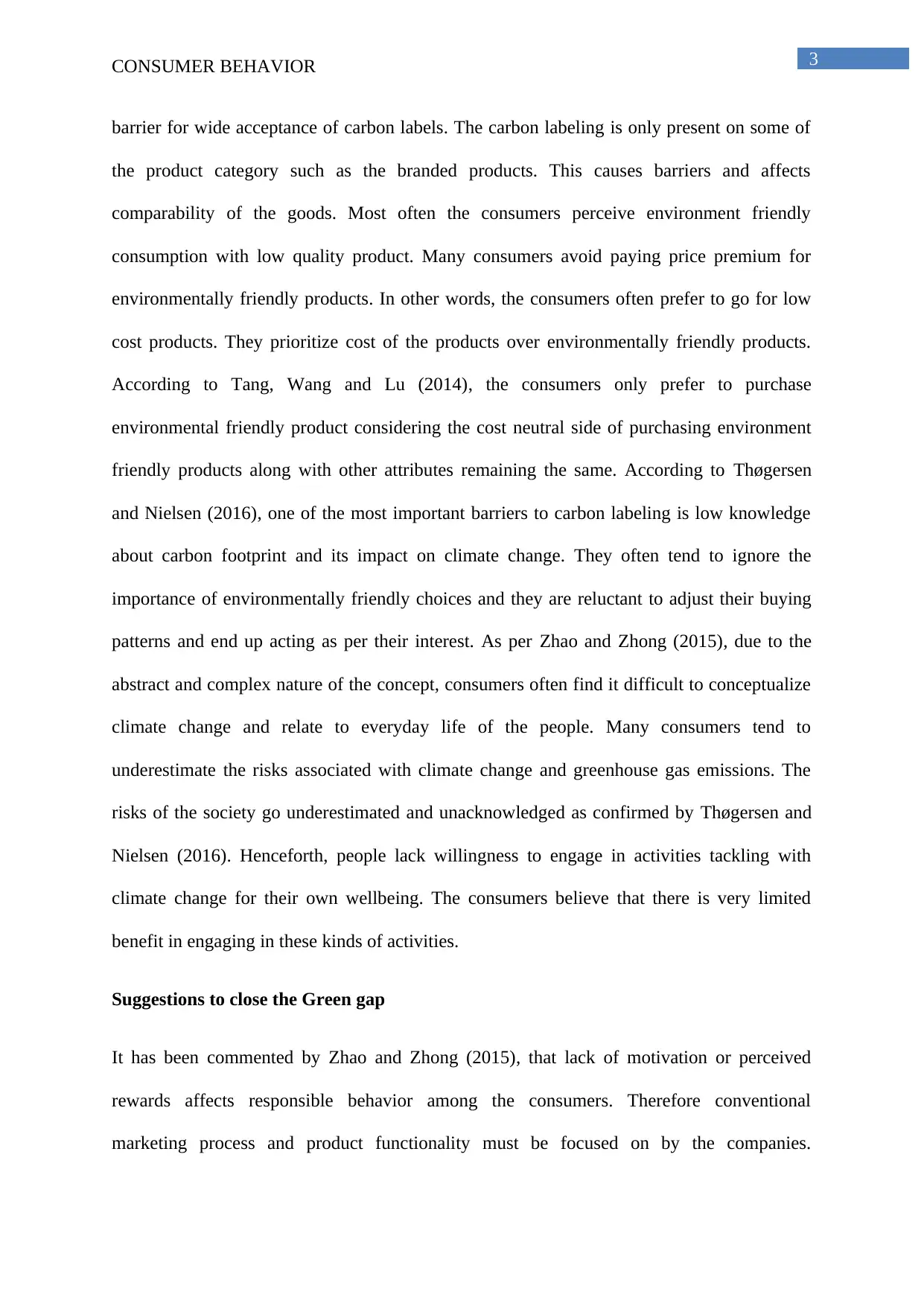
3CONSUMER BEHAVIOR
barrier for wide acceptance of carbon labels. The carbon labeling is only present on some of
the product category such as the branded products. This causes barriers and affects
comparability of the goods. Most often the consumers perceive environment friendly
consumption with low quality product. Many consumers avoid paying price premium for
environmentally friendly products. In other words, the consumers often prefer to go for low
cost products. They prioritize cost of the products over environmentally friendly products.
According to Tang, Wang and Lu (2014), the consumers only prefer to purchase
environmental friendly product considering the cost neutral side of purchasing environment
friendly products along with other attributes remaining the same. According to Thøgersen
and Nielsen (2016), one of the most important barriers to carbon labeling is low knowledge
about carbon footprint and its impact on climate change. They often tend to ignore the
importance of environmentally friendly choices and they are reluctant to adjust their buying
patterns and end up acting as per their interest. As per Zhao and Zhong (2015), due to the
abstract and complex nature of the concept, consumers often find it difficult to conceptualize
climate change and relate to everyday life of the people. Many consumers tend to
underestimate the risks associated with climate change and greenhouse gas emissions. The
risks of the society go underestimated and unacknowledged as confirmed by Thøgersen and
Nielsen (2016). Henceforth, people lack willingness to engage in activities tackling with
climate change for their own wellbeing. The consumers believe that there is very limited
benefit in engaging in these kinds of activities.
Suggestions to close the Green gap
It has been commented by Zhao and Zhong (2015), that lack of motivation or perceived
rewards affects responsible behavior among the consumers. Therefore conventional
marketing process and product functionality must be focused on by the companies.
barrier for wide acceptance of carbon labels. The carbon labeling is only present on some of
the product category such as the branded products. This causes barriers and affects
comparability of the goods. Most often the consumers perceive environment friendly
consumption with low quality product. Many consumers avoid paying price premium for
environmentally friendly products. In other words, the consumers often prefer to go for low
cost products. They prioritize cost of the products over environmentally friendly products.
According to Tang, Wang and Lu (2014), the consumers only prefer to purchase
environmental friendly product considering the cost neutral side of purchasing environment
friendly products along with other attributes remaining the same. According to Thøgersen
and Nielsen (2016), one of the most important barriers to carbon labeling is low knowledge
about carbon footprint and its impact on climate change. They often tend to ignore the
importance of environmentally friendly choices and they are reluctant to adjust their buying
patterns and end up acting as per their interest. As per Zhao and Zhong (2015), due to the
abstract and complex nature of the concept, consumers often find it difficult to conceptualize
climate change and relate to everyday life of the people. Many consumers tend to
underestimate the risks associated with climate change and greenhouse gas emissions. The
risks of the society go underestimated and unacknowledged as confirmed by Thøgersen and
Nielsen (2016). Henceforth, people lack willingness to engage in activities tackling with
climate change for their own wellbeing. The consumers believe that there is very limited
benefit in engaging in these kinds of activities.
Suggestions to close the Green gap
It has been commented by Zhao and Zhong (2015), that lack of motivation or perceived
rewards affects responsible behavior among the consumers. Therefore conventional
marketing process and product functionality must be focused on by the companies.
Paraphrase This Document
Need a fresh take? Get an instant paraphrase of this document with our AI Paraphraser
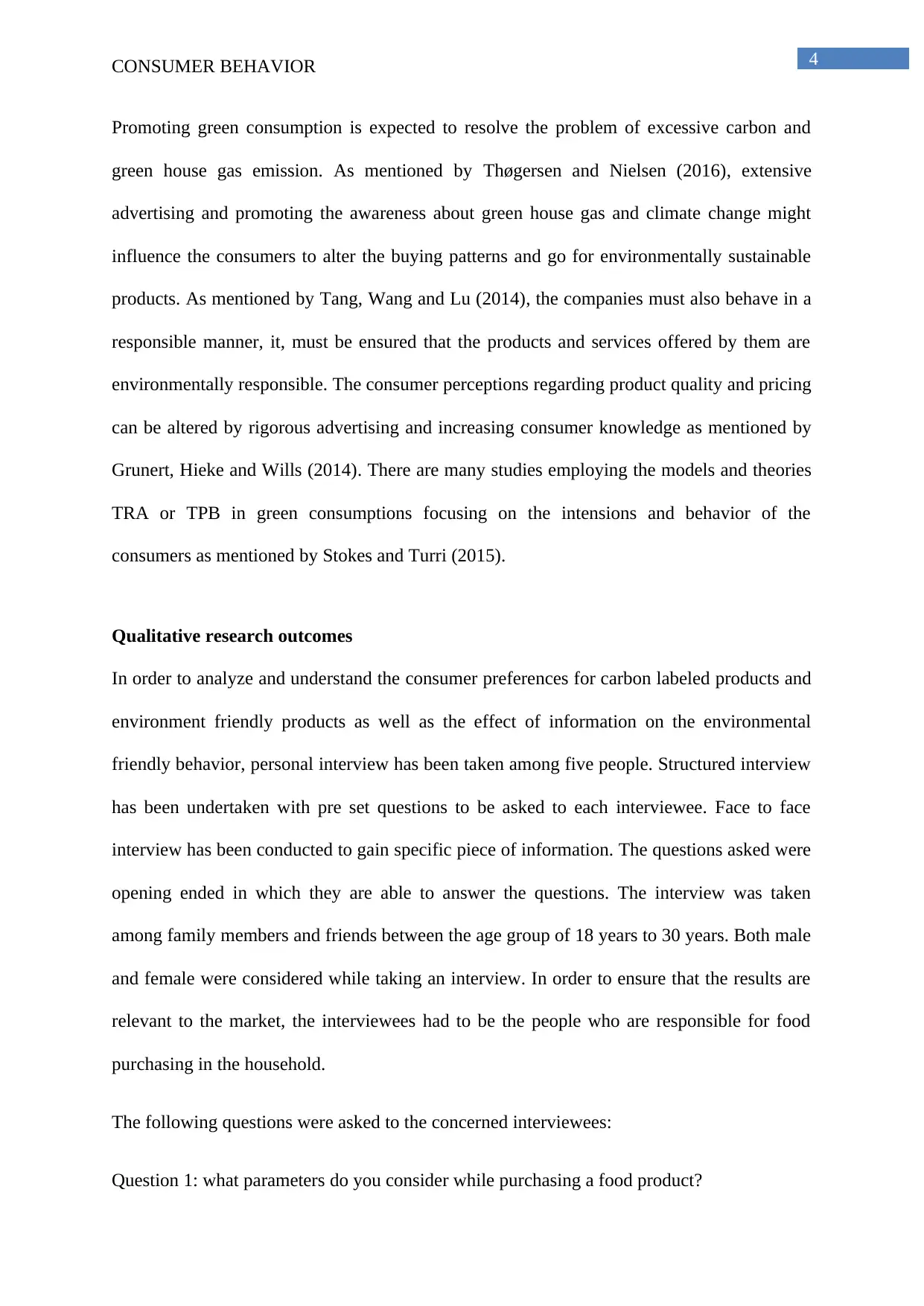
4CONSUMER BEHAVIOR
Promoting green consumption is expected to resolve the problem of excessive carbon and
green house gas emission. As mentioned by Thøgersen and Nielsen (2016), extensive
advertising and promoting the awareness about green house gas and climate change might
influence the consumers to alter the buying patterns and go for environmentally sustainable
products. As mentioned by Tang, Wang and Lu (2014), the companies must also behave in a
responsible manner, it, must be ensured that the products and services offered by them are
environmentally responsible. The consumer perceptions regarding product quality and pricing
can be altered by rigorous advertising and increasing consumer knowledge as mentioned by
Grunert, Hieke and Wills (2014). There are many studies employing the models and theories
TRA or TPB in green consumptions focusing on the intensions and behavior of the
consumers as mentioned by Stokes and Turri (2015).
Qualitative research outcomes
In order to analyze and understand the consumer preferences for carbon labeled products and
environment friendly products as well as the effect of information on the environmental
friendly behavior, personal interview has been taken among five people. Structured interview
has been undertaken with pre set questions to be asked to each interviewee. Face to face
interview has been conducted to gain specific piece of information. The questions asked were
opening ended in which they are able to answer the questions. The interview was taken
among family members and friends between the age group of 18 years to 30 years. Both male
and female were considered while taking an interview. In order to ensure that the results are
relevant to the market, the interviewees had to be the people who are responsible for food
purchasing in the household.
The following questions were asked to the concerned interviewees:
Question 1: what parameters do you consider while purchasing a food product?
Promoting green consumption is expected to resolve the problem of excessive carbon and
green house gas emission. As mentioned by Thøgersen and Nielsen (2016), extensive
advertising and promoting the awareness about green house gas and climate change might
influence the consumers to alter the buying patterns and go for environmentally sustainable
products. As mentioned by Tang, Wang and Lu (2014), the companies must also behave in a
responsible manner, it, must be ensured that the products and services offered by them are
environmentally responsible. The consumer perceptions regarding product quality and pricing
can be altered by rigorous advertising and increasing consumer knowledge as mentioned by
Grunert, Hieke and Wills (2014). There are many studies employing the models and theories
TRA or TPB in green consumptions focusing on the intensions and behavior of the
consumers as mentioned by Stokes and Turri (2015).
Qualitative research outcomes
In order to analyze and understand the consumer preferences for carbon labeled products and
environment friendly products as well as the effect of information on the environmental
friendly behavior, personal interview has been taken among five people. Structured interview
has been undertaken with pre set questions to be asked to each interviewee. Face to face
interview has been conducted to gain specific piece of information. The questions asked were
opening ended in which they are able to answer the questions. The interview was taken
among family members and friends between the age group of 18 years to 30 years. Both male
and female were considered while taking an interview. In order to ensure that the results are
relevant to the market, the interviewees had to be the people who are responsible for food
purchasing in the household.
The following questions were asked to the concerned interviewees:
Question 1: what parameters do you consider while purchasing a food product?
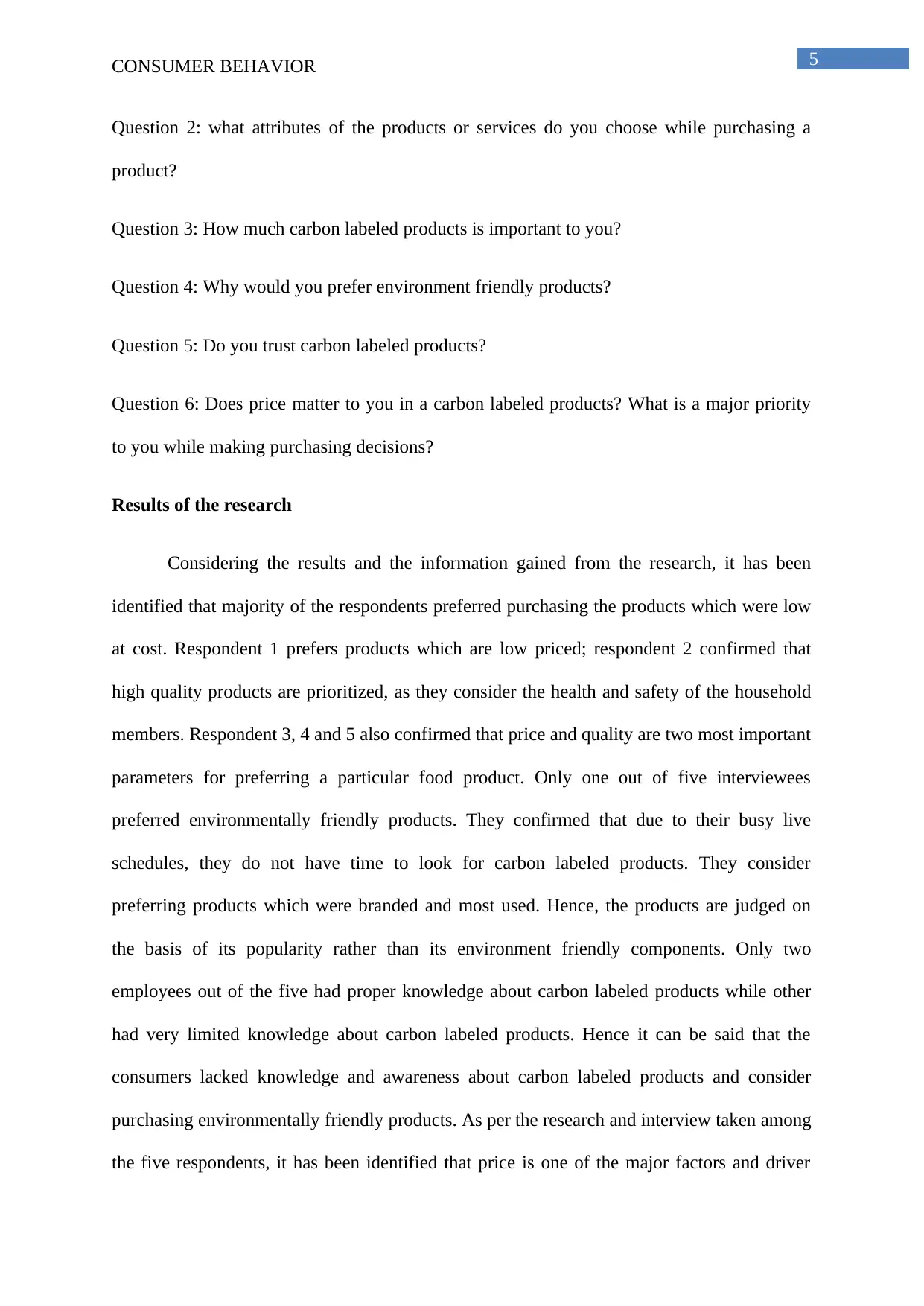
5CONSUMER BEHAVIOR
Question 2: what attributes of the products or services do you choose while purchasing a
product?
Question 3: How much carbon labeled products is important to you?
Question 4: Why would you prefer environment friendly products?
Question 5: Do you trust carbon labeled products?
Question 6: Does price matter to you in a carbon labeled products? What is a major priority
to you while making purchasing decisions?
Results of the research
Considering the results and the information gained from the research, it has been
identified that majority of the respondents preferred purchasing the products which were low
at cost. Respondent 1 prefers products which are low priced; respondent 2 confirmed that
high quality products are prioritized, as they consider the health and safety of the household
members. Respondent 3, 4 and 5 also confirmed that price and quality are two most important
parameters for preferring a particular food product. Only one out of five interviewees
preferred environmentally friendly products. They confirmed that due to their busy live
schedules, they do not have time to look for carbon labeled products. They consider
preferring products which were branded and most used. Hence, the products are judged on
the basis of its popularity rather than its environment friendly components. Only two
employees out of the five had proper knowledge about carbon labeled products while other
had very limited knowledge about carbon labeled products. Hence it can be said that the
consumers lacked knowledge and awareness about carbon labeled products and consider
purchasing environmentally friendly products. As per the research and interview taken among
the five respondents, it has been identified that price is one of the major factors and driver
Question 2: what attributes of the products or services do you choose while purchasing a
product?
Question 3: How much carbon labeled products is important to you?
Question 4: Why would you prefer environment friendly products?
Question 5: Do you trust carbon labeled products?
Question 6: Does price matter to you in a carbon labeled products? What is a major priority
to you while making purchasing decisions?
Results of the research
Considering the results and the information gained from the research, it has been
identified that majority of the respondents preferred purchasing the products which were low
at cost. Respondent 1 prefers products which are low priced; respondent 2 confirmed that
high quality products are prioritized, as they consider the health and safety of the household
members. Respondent 3, 4 and 5 also confirmed that price and quality are two most important
parameters for preferring a particular food product. Only one out of five interviewees
preferred environmentally friendly products. They confirmed that due to their busy live
schedules, they do not have time to look for carbon labeled products. They consider
preferring products which were branded and most used. Hence, the products are judged on
the basis of its popularity rather than its environment friendly components. Only two
employees out of the five had proper knowledge about carbon labeled products while other
had very limited knowledge about carbon labeled products. Hence it can be said that the
consumers lacked knowledge and awareness about carbon labeled products and consider
purchasing environmentally friendly products. As per the research and interview taken among
the five respondents, it has been identified that price is one of the major factors and driver
⊘ This is a preview!⊘
Do you want full access?
Subscribe today to unlock all pages.

Trusted by 1+ million students worldwide
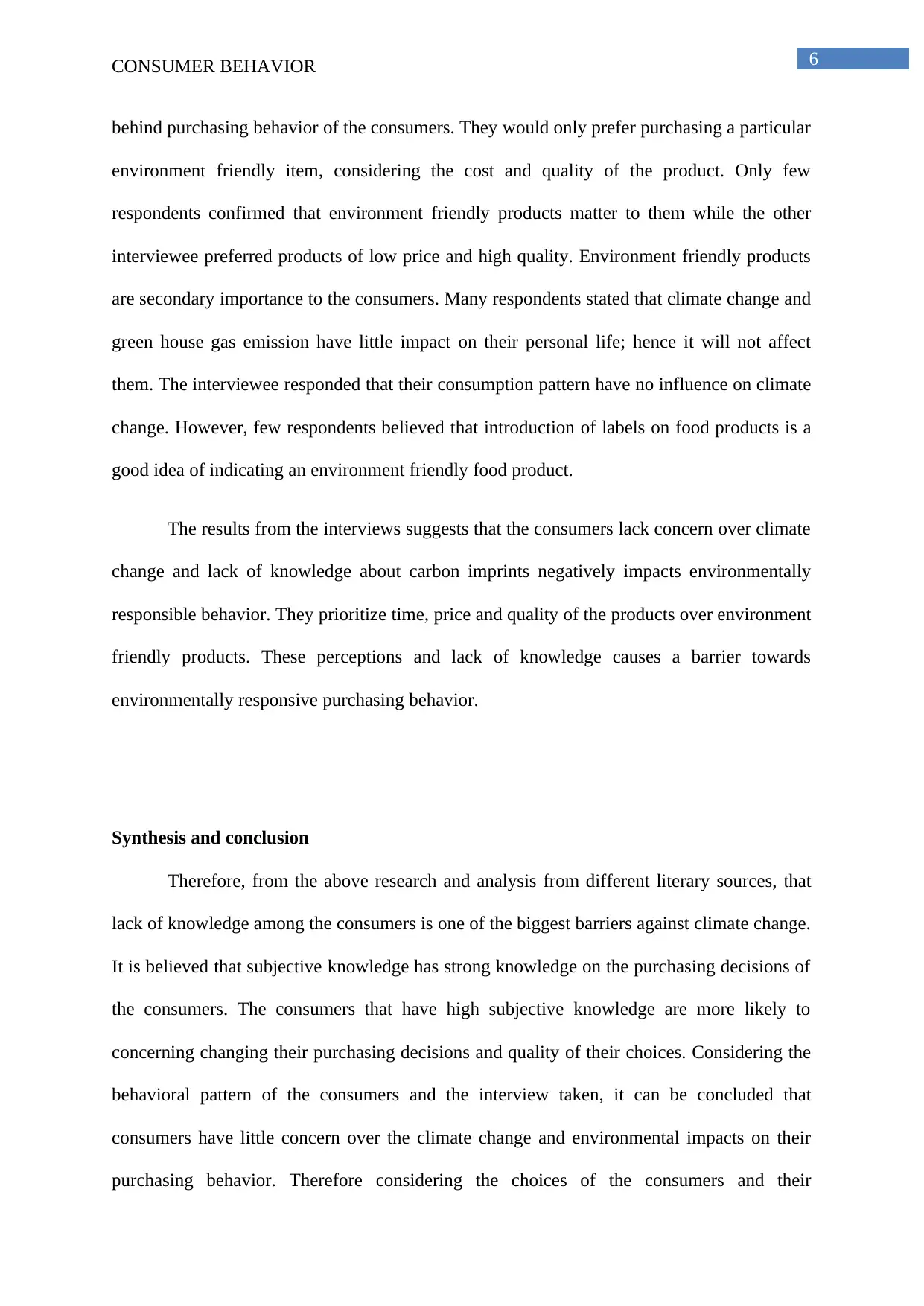
6CONSUMER BEHAVIOR
behind purchasing behavior of the consumers. They would only prefer purchasing a particular
environment friendly item, considering the cost and quality of the product. Only few
respondents confirmed that environment friendly products matter to them while the other
interviewee preferred products of low price and high quality. Environment friendly products
are secondary importance to the consumers. Many respondents stated that climate change and
green house gas emission have little impact on their personal life; hence it will not affect
them. The interviewee responded that their consumption pattern have no influence on climate
change. However, few respondents believed that introduction of labels on food products is a
good idea of indicating an environment friendly food product.
The results from the interviews suggests that the consumers lack concern over climate
change and lack of knowledge about carbon imprints negatively impacts environmentally
responsible behavior. They prioritize time, price and quality of the products over environment
friendly products. These perceptions and lack of knowledge causes a barrier towards
environmentally responsive purchasing behavior.
Synthesis and conclusion
Therefore, from the above research and analysis from different literary sources, that
lack of knowledge among the consumers is one of the biggest barriers against climate change.
It is believed that subjective knowledge has strong knowledge on the purchasing decisions of
the consumers. The consumers that have high subjective knowledge are more likely to
concerning changing their purchasing decisions and quality of their choices. Considering the
behavioral pattern of the consumers and the interview taken, it can be concluded that
consumers have little concern over the climate change and environmental impacts on their
purchasing behavior. Therefore considering the choices of the consumers and their
behind purchasing behavior of the consumers. They would only prefer purchasing a particular
environment friendly item, considering the cost and quality of the product. Only few
respondents confirmed that environment friendly products matter to them while the other
interviewee preferred products of low price and high quality. Environment friendly products
are secondary importance to the consumers. Many respondents stated that climate change and
green house gas emission have little impact on their personal life; hence it will not affect
them. The interviewee responded that their consumption pattern have no influence on climate
change. However, few respondents believed that introduction of labels on food products is a
good idea of indicating an environment friendly food product.
The results from the interviews suggests that the consumers lack concern over climate
change and lack of knowledge about carbon imprints negatively impacts environmentally
responsible behavior. They prioritize time, price and quality of the products over environment
friendly products. These perceptions and lack of knowledge causes a barrier towards
environmentally responsive purchasing behavior.
Synthesis and conclusion
Therefore, from the above research and analysis from different literary sources, that
lack of knowledge among the consumers is one of the biggest barriers against climate change.
It is believed that subjective knowledge has strong knowledge on the purchasing decisions of
the consumers. The consumers that have high subjective knowledge are more likely to
concerning changing their purchasing decisions and quality of their choices. Considering the
behavioral pattern of the consumers and the interview taken, it can be concluded that
consumers have little concern over the climate change and environmental impacts on their
purchasing behavior. Therefore considering the choices of the consumers and their
Paraphrase This Document
Need a fresh take? Get an instant paraphrase of this document with our AI Paraphraser
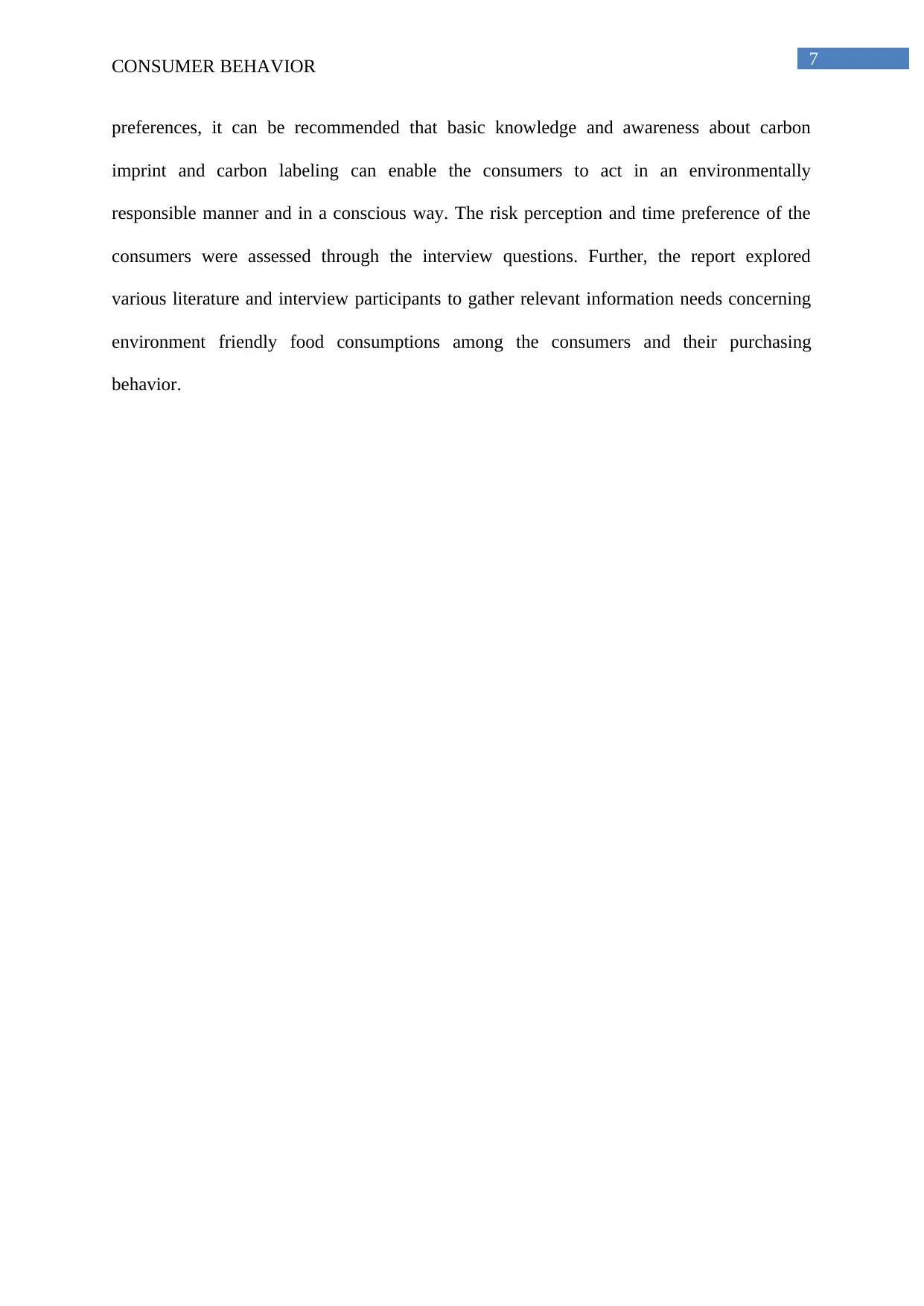
7CONSUMER BEHAVIOR
preferences, it can be recommended that basic knowledge and awareness about carbon
imprint and carbon labeling can enable the consumers to act in an environmentally
responsible manner and in a conscious way. The risk perception and time preference of the
consumers were assessed through the interview questions. Further, the report explored
various literature and interview participants to gather relevant information needs concerning
environment friendly food consumptions among the consumers and their purchasing
behavior.
preferences, it can be recommended that basic knowledge and awareness about carbon
imprint and carbon labeling can enable the consumers to act in an environmentally
responsible manner and in a conscious way. The risk perception and time preference of the
consumers were assessed through the interview questions. Further, the report explored
various literature and interview participants to gather relevant information needs concerning
environment friendly food consumptions among the consumers and their purchasing
behavior.
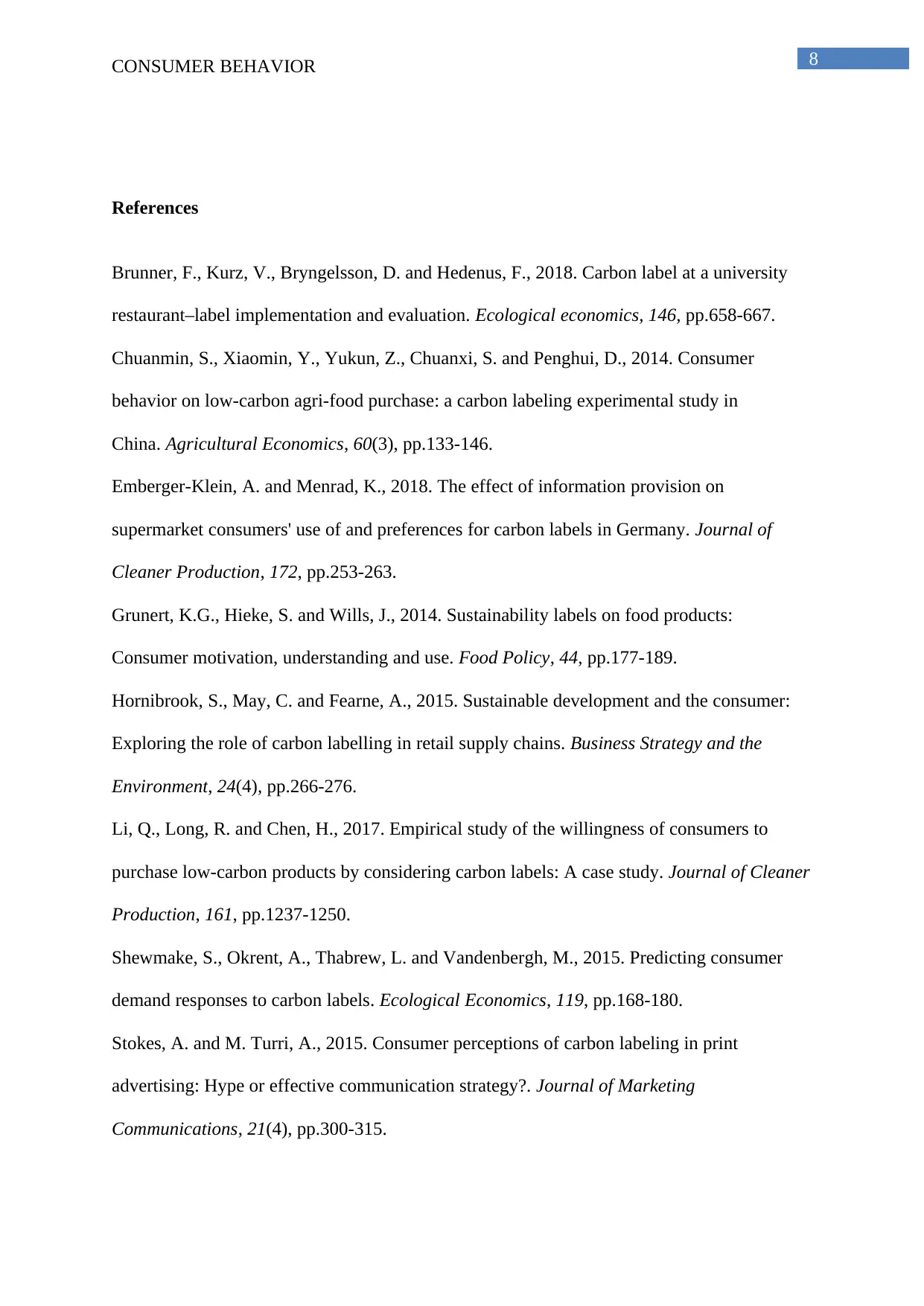
8CONSUMER BEHAVIOR
References
Brunner, F., Kurz, V., Bryngelsson, D. and Hedenus, F., 2018. Carbon label at a university
restaurant–label implementation and evaluation. Ecological economics, 146, pp.658-667.
Chuanmin, S., Xiaomin, Y., Yukun, Z., Chuanxi, S. and Penghui, D., 2014. Consumer
behavior on low-carbon agri-food purchase: a carbon labeling experimental study in
China. Agricultural Economics, 60(3), pp.133-146.
Emberger-Klein, A. and Menrad, K., 2018. The effect of information provision on
supermarket consumers' use of and preferences for carbon labels in Germany. Journal of
Cleaner Production, 172, pp.253-263.
Grunert, K.G., Hieke, S. and Wills, J., 2014. Sustainability labels on food products:
Consumer motivation, understanding and use. Food Policy, 44, pp.177-189.
Hornibrook, S., May, C. and Fearne, A., 2015. Sustainable development and the consumer:
Exploring the role of carbon labelling in retail supply chains. Business Strategy and the
Environment, 24(4), pp.266-276.
Li, Q., Long, R. and Chen, H., 2017. Empirical study of the willingness of consumers to
purchase low-carbon products by considering carbon labels: A case study. Journal of Cleaner
Production, 161, pp.1237-1250.
Shewmake, S., Okrent, A., Thabrew, L. and Vandenbergh, M., 2015. Predicting consumer
demand responses to carbon labels. Ecological Economics, 119, pp.168-180.
Stokes, A. and M. Turri, A., 2015. Consumer perceptions of carbon labeling in print
advertising: Hype or effective communication strategy?. Journal of Marketing
Communications, 21(4), pp.300-315.
References
Brunner, F., Kurz, V., Bryngelsson, D. and Hedenus, F., 2018. Carbon label at a university
restaurant–label implementation and evaluation. Ecological economics, 146, pp.658-667.
Chuanmin, S., Xiaomin, Y., Yukun, Z., Chuanxi, S. and Penghui, D., 2014. Consumer
behavior on low-carbon agri-food purchase: a carbon labeling experimental study in
China. Agricultural Economics, 60(3), pp.133-146.
Emberger-Klein, A. and Menrad, K., 2018. The effect of information provision on
supermarket consumers' use of and preferences for carbon labels in Germany. Journal of
Cleaner Production, 172, pp.253-263.
Grunert, K.G., Hieke, S. and Wills, J., 2014. Sustainability labels on food products:
Consumer motivation, understanding and use. Food Policy, 44, pp.177-189.
Hornibrook, S., May, C. and Fearne, A., 2015. Sustainable development and the consumer:
Exploring the role of carbon labelling in retail supply chains. Business Strategy and the
Environment, 24(4), pp.266-276.
Li, Q., Long, R. and Chen, H., 2017. Empirical study of the willingness of consumers to
purchase low-carbon products by considering carbon labels: A case study. Journal of Cleaner
Production, 161, pp.1237-1250.
Shewmake, S., Okrent, A., Thabrew, L. and Vandenbergh, M., 2015. Predicting consumer
demand responses to carbon labels. Ecological Economics, 119, pp.168-180.
Stokes, A. and M. Turri, A., 2015. Consumer perceptions of carbon labeling in print
advertising: Hype or effective communication strategy?. Journal of Marketing
Communications, 21(4), pp.300-315.
⊘ This is a preview!⊘
Do you want full access?
Subscribe today to unlock all pages.

Trusted by 1+ million students worldwide
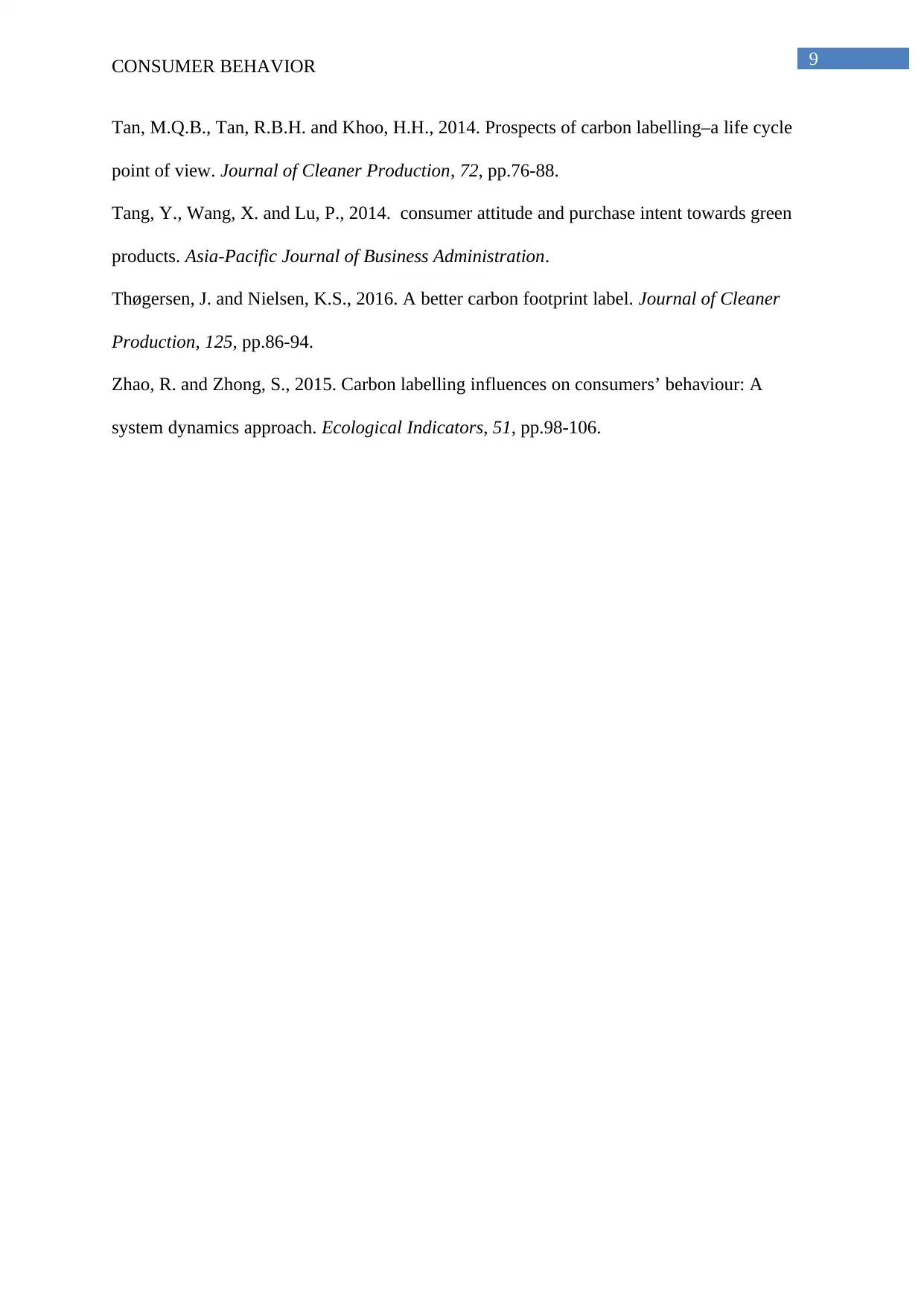
9CONSUMER BEHAVIOR
Tan, M.Q.B., Tan, R.B.H. and Khoo, H.H., 2014. Prospects of carbon labelling–a life cycle
point of view. Journal of Cleaner Production, 72, pp.76-88.
Tang, Y., Wang, X. and Lu, P., 2014. consumer attitude and purchase intent towards green
products. Asia-Pacific Journal of Business Administration.
Thøgersen, J. and Nielsen, K.S., 2016. A better carbon footprint label. Journal of Cleaner
Production, 125, pp.86-94.
Zhao, R. and Zhong, S., 2015. Carbon labelling influences on consumers’ behaviour: A
system dynamics approach. Ecological Indicators, 51, pp.98-106.
Tan, M.Q.B., Tan, R.B.H. and Khoo, H.H., 2014. Prospects of carbon labelling–a life cycle
point of view. Journal of Cleaner Production, 72, pp.76-88.
Tang, Y., Wang, X. and Lu, P., 2014. consumer attitude and purchase intent towards green
products. Asia-Pacific Journal of Business Administration.
Thøgersen, J. and Nielsen, K.S., 2016. A better carbon footprint label. Journal of Cleaner
Production, 125, pp.86-94.
Zhao, R. and Zhong, S., 2015. Carbon labelling influences on consumers’ behaviour: A
system dynamics approach. Ecological Indicators, 51, pp.98-106.
1 out of 10
Your All-in-One AI-Powered Toolkit for Academic Success.
+13062052269
info@desklib.com
Available 24*7 on WhatsApp / Email
![[object Object]](/_next/static/media/star-bottom.7253800d.svg)
Unlock your academic potential
Copyright © 2020–2026 A2Z Services. All Rights Reserved. Developed and managed by ZUCOL.


